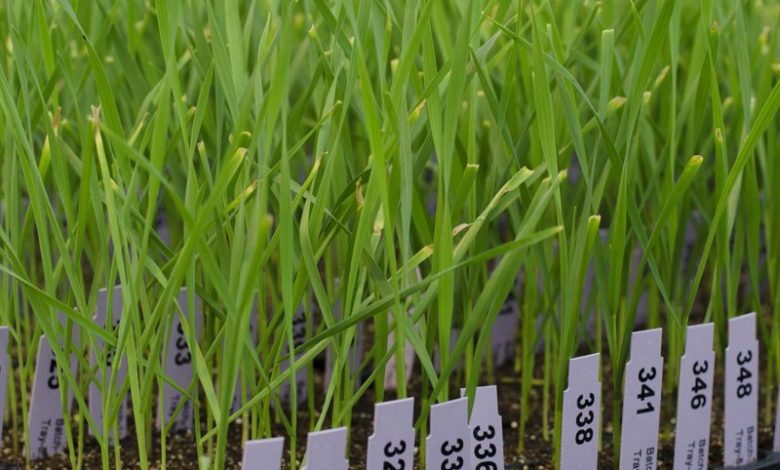Making plant breeding a game changer
Supply of products is becoming a challenge due to growing population and climate change

Despite that the industry has untapped potential, there is food insecurity. Supply of products is becoming a challenge due to growing population and climate change. There is, therefore, the need for high-quality seedlings. Several research institutions run crop breeding programmes to enhance food security, reduce poverty and improve health and nutrition. Their investments in crop improvement run into the millions of dollars and naira.
For stakeholders, innovations that can help farmers adapt to changing conditions and pest pressures have become critical.
If Nigeria is to compete on the global stage and achieve its potential, the Director-General of National Agricultural Seeds Council (NASC), Dr Olusegun Ojo, noted that farmers should have access to improved crops that their competitors have.
At a virtual meeting, Ojo maintained that the food production system needed to evolve to help unlock the potential of the sector.
He spoke about the potential of plant breeding in terms of producing better yields and protecting the food supply from climate change, disease, and pests, which would hamper growers and threaten access to safe, abundant food.
He said the government was committed to strengthening plant breeders’ protection to provide motivation and incentives to increase investment in research and development for the crop sector, giving our farmers greater access to newest crop varieties.
Ojo reiterated that providing healthy and high-quality seeds for farmers and enabling local production were an important objective of the Federal Government.
In line with this, the Council is driving breeding programmes to increase the rates of genetic gain and the scale of impact through the adoption of farmer-preferred, market-demanded and climate-resilient varieties.
To achieve this, it has fostered a closer cooperation between research institutes and universities, seed companies in the private sector, as well as multilateral seed companies.
Ensuring high-quality seed production has become important and constitutes the foundation of resilient agricultural production. Ojo and other experts emphasised the need for a Plant Variety Protection (PVP) law to prevent intellectual property of seed breeders, from being stolen.
The absence of a PVP, the experts argued, would leave farmers with low-quality and adulterated seeds that are dangerous to crop production and food security.
Whether it is developing a crop variety more resistant to disease, or a high-fibre crop that produces healthier oil, the sector has taken delivery of innovations that offer benefits to farmers, food processors and consumers alike.
At the moment, organisations such as the International Institute of Tropical Agriculture (IITA) are bringing new plant varieties to the space.
The private plant breeding sector dominated by big multinational companies, such as Bayer, Syngenta and Corteva, offer highly productive seeds to farmers. To achieve this, an immense amount of time and investment are required.
In most cases, plant breeders spend 10 to 12 years working on a new variety. The protection of their works is important for commercial success and for farmers to have access to a wider variety of seeds.
Ojo said the existence of a PVP law would encourage plant breeders to develop superior varieties that would lead to the agricultural sector transformation.
“Section 39 of the National Agricultural Seeds Council (NASC) Act 21 of 2019 signed into law by President Muhammadu Buhari states the important need for the granting of plant breeders rights to be provided for in an Act of the National Assembly on plant variety protection,” he said.
The Senate, on March 3, 2021, passed into law the PVP Bill, and it is awaiting presidential assent. The law will give the breeder exclusive control over the variety, right to use the variety, and encourages the development of better plant varieties.
While the council and other stakeholders are driving the bill, opposition said it would promote Genetically Modified Organisms (GMOs).
But Ojo differed.
His words: “I have listened to non-state actors try so hard to unintelligently link the bill to GMO or the subversion of farmers’ rights.
“The bill has nothing to do with the advancement of GMO in Nigeria.There are laws and state agencies that have been given this responsibility and the PVP has nothing to do with that.
“Supporting the development of new plant varieties is an essential response to achieving food security and agricultural sustainability. Improved varieties are a necessary and cost-effective means of improving productivity, quality and marketability for farmers and growers.
“However, breeding new varieties of plants requires a substantial investment of skills, labour, material resources, money and time.”
Lead Partner, Sustainable Entrepreneurship and Economic Development Initiative (SEEDI), Celestine Okeke, said: “Nigeria is, no doubt, ripe for a Plant Breeders Protection Law.”
He argued that if writers had laws protecting their texts, artists had laws protecting their intellectual properties and authors had laws protecting their publications, plant breeders, who spend upwards of 12 months researching on plant varieties, should be protected by law too.
“The poverty levels in the country, coupled with growing food insecurity and rising food prices call for immediate action to remedy the dearth of research and development in the seed sector.
“The seed sector is the bedrock of the agricultural sector; without seeds, there cannot be an agricultural sector and without continuous research and development in the seed sector, there will continue to be an agricultural sector incapable of supporting our food security aspirations.”
“The bill would enable farmer’s access wide varieties of improved plants that would result from breeding programmes that would be protected by the law and grant plant breeders intellectual property right over their materials.
“This would spur them to invest more in plant breeding and it would greatly develop the sector,” he added.
Okeke noted: “The government and other African countries have been falling behind in investing in research understandably because our economy has not been as it used to be.
“If private sector will invest in plant breeding, it needs a law to protect its investment in the same manner we have law protecting authors of book, we also have a law in the entertainment industry for musicians and film producers, in that same manner we need to have the PVP law, without that, we cannot sustainably develop the sector.”
Plant breeders should invest in the creation of new varieties to meet the requirements of the modern market, which demands improved quality, disease resistance, productivity and environmental awareness. It is common knowledge that IP protection helps to ensure a return on investment and prevents counterfeiting. Plant breeders’ rights, much like other forms of IP rights, protect research and creativity.
The Business Development Manager, Eastwest Seed International, Hadiza Yaro, said the major reason for low yields in developing countries was lack of improved seeds because most of the traditional varieties have not been improved on for many centuries.
She said modern breeding had enabled farmers to have better and higher yields, and the varieties accounted for over 50 per cent of farmers’ output, in addition to other practices such as the right fertiliser, technique and better pest and disease control.
The President, Nigerian Plant Breeders Association (NPBA), Prof. Chidozie Egezi, noted that breeders needed a stable and predictable framework of protection as new plant varieties were urgently needed to respond to the challenges of climate change and limitations.
He said NPBA had many plant breeders who supported the law, adding that Nigeria is a food deficit country, importing so much and spending several millions of dollars yearly to supplement production.
“When you look at the food system of Nigeria, you consider how much we are producing locally and importing, Nigeria is a food deficit country, importing so much and spending several millions of dollars yearly to supplement our production.
“One of the few challenges in the sector is the varieties that we grow in the country.
“The law will promote and ensure we get the right kind of investment, it will also have a longer term effect on how farmers benefit from growing the right kind of variety; and it will reduce environmental stress like climate change, flooding and drought.
The Technical Adviser to the Director-General, NASC, Dr. Okelola Folarin, noted that a robust plant variety rights system would incentivise breeders to develop new varieties, thus contributing to growth and food security.
He added that the law would make it possible for breeders to take appropriate action against the unauthorised or unintentional outflow of their varieties overseas.
Okelola explained that the law would give Nigeria the opportunity to collect royalties from countries using our materials, citing Malaysia who took oil palm seeds from Nigeria many years ago.
He said: “We gave oil palm seedlings to Malaysia many years back and they took the oil palm and went into research and improved on it. They protected the things that had come out of those efforts and today Malaysia is one of the leading countries benefiting from oil palm.
“It will amaze you that the oil palms seedlings Edo, Akwa Ibom and Cross River states are buying are Malaysian oil palm seedlings. These are things we are supposed to be collecting royalties from. We are buying because they have added value to what they took from us. Why don’t we improve on what we have then export it? Then wherever they use it, the money will be coming back to us. It will also stop breeders from leaving Nigeria to work in other places where they know they would get better benefit.
“It took Ghana 22 years to pass the PVP law. Just recently, the parliament of Ghana passed a law and the president signed it. We have been misinformed by people against this bill for a long number of years.”
According to him, the law provides steps for the registration of a plant variety.
So far, countries such as Morocco, Tunisia, Egypt, South Africa, Kenya, and Tanzania have joined the International Union for the Protection of New Varieties of Plants (UPOV).
Recent studies have confirmed that the PVP system would increase food security; create a sustainable seed industry, which would enable farmers to access viable seeds for greater economic returns.




